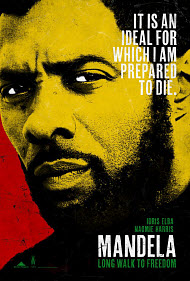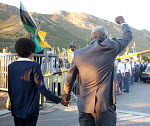Mandela: Long Walk to Freedom
 for some intense sequences of violence and disturbing images, sexual content and brief strong language.
for some intense sequences of violence and disturbing images, sexual content and brief strong language.
Reviewed by: Spencer Schumacher
CONTRIBUTOR
| Moral Rating: | Average |
| Moviemaking Quality: |
|
| Primary Audience: | Adults |
| Genre: | Biography Drama |
| Length: | 2 hr. 21 min. |
| Year of Release: | 2013 |
| USA Release: |
October 9, 2013 (festival) November 29, 2013 (limited) December 25, 2013 (wide) DVD: March 18, 2014 |



RACISM—What are the consequences of racial prejudice and false beliefs about the origin of races? Answer
Is the film’s depiction of Nelson Mandela and the ANC accurate?
“Talking about God, Nelson says he doesn’t see Him helping their people and only sees Him helping their white repressors.”
“From One Blood: The Story of Gerrit Wolfaardt” (2003)
“Final Solution” (2002)
“Catch a Fire” (2006)
“In My Country” a.k.a. Country of My Skull (2005)
“Stander” (2004)
“Invictus” (2009)
| Featuring |
|---|
|
Idris Elba … Nelson Mandela Naomie Harris … Winnie Madikizela Tony Kgoroge … Walter Sisulu Riaad Moosa … Ahmed Kathrada Zolani Mkiva … Raymond Mhlaba Simo Mogwaza … Andrew Mlangeni Fana Mokoena … Govan Mbeki Thapelo Mokoena … Elias Motsoaledi Jamie Bartlett … James Gregory Deon Lotz … Kobie Coetzee Terry Pheto … Evelyn Mase Zikhona Sodlaka … Nosekeni S’Thandiwe Kgoroge … Albertina Sisulu Tshallo Sputla Chokwe … Oliver Tambo Sello Maake … Albert Luthuli James Cunningham … George Bizos Zenzo Ngqobe … Patrick Lekota Gys de Villiers … President De Klerk David Butler … Colonel Badenhorst See all » |
| Director |
|
Justin Chadwick |
| Producer |
|
Videovision Entertainment Distant Horizon See all » |
| Distributor |
“If you talk to a man in a language he understands, that goes to his head. If you talk to him in his language, that goes to his heart” —Nelson Mandela.
If cinema is truly a universal language than director Justin Chadwick and writer William Nicholson, in their biographical epic “Mandela: Long Walk to Freedom”, are trying to show Nelson Mandela was more than a hero, he was a man, a man that spoke in a language that everyone could understand. Beyond the myth, beyond the legend, they are going beyond broad strokes and painting a picture of a man with faults, flaws and even failures.
“Long Walk to Freedom” is the biopic tale of Nelson Mandela’s life journey from his childhood to his ascension to the presidency of South Africa. The movie is based on the Mandela autobiography, and, from what I’ve read, follows the book pretty faithfully.
As most biopics go, the story is told in a linear fashion following the trajectory of Mandela’s life, and, like a historic time line, hits the key points of his life and moves forward from one historic event to another. It starts briefly with his childhood, his years as a lawyer, then moves chronologically to the events leading up to his arrest, his 27 years in prison, and his election as South Africa’s first democratically elected black President.
The biggest criticism against most biopics is that they tend to cast their subjects in a very soft and flattering light. Biopics tend to gloss over or purposely avoid showing their subject in anything that could possibly stain their subject in the slightest bit. Given the larger-than-life subject for this film, the filmmakers had a daunting task, however, the film does do a credible job in portraying Mandela as a living, breathing human being, not perfect, but continually striving.
The main reason for this portrayal is lead actor Idris Elba who plays the titular role. Most biopics struggle with finding the balance in presenting their subject as a hero without elevating them to the status of martyr. Elba strikes a fine balance, and presents Mandela as an empathetic hero who has his faults. We see the struggles he faces, particularly with his wife Winnie, played by Naomie Harris. The story doesn’t shy away from their domestic quarrels and arguments, often times showing how Mandela could be unkind and sometimes even cruel towards her.
The film is relatively light in material a general audience might find offensive. There is a brief flash of male frontal nudity during a scene where men remove their clothes to go swimming. Also, there is a prison scene where prisoners are made to remove their clothes.
Much of the action during the second half of the film involves political unrest, and there are scenes of rioting and acts of mass violence. Some of the more intense scenes involve women and children being gunned down by military police. There is a disturbing scene of a man being hacked to death with a machete, subsequently tied up, doused with gasoline and set on fire.
Profanity: There are a handful of instances of the s-word, but the most objectionable language is the numerous utterances of racial epithets and derogatory terms.
With awards season just around the corner, there is little doubt that “Mandela” is on the short list of movies that will be nominated for golden statues. With a number of films this year, vying for best picture, Oscar® will more than likely look over “Mandela,” however it would be a shame if they chose to ignore Idris Elba and his tremendous performance in bringing a true-life hero to the silver screen.
Violence: Heavy to extreme / Profanity: Heavy—f-word (1), “hell” (1), “damn” (1), s-words (4) / Nudity: Heavy
See list of Relevant Issues—questions-and-answers.


PLEASE share your observations and insights to be posted here.



In 1986 WINNIE MANDELA, then-wife of the imprisoned Nelson Mandela, stated, “With our boxes of matches and our necklaces we shall liberate this country” which was widely seen as an implicit endorsement of necklacing…” Folks, you don’t DO or APPROVE this type of thing (i.e., “necklacing”) without at least the silent “agreement” of your spouse. Please, LET'S STOP MAKING and ATTENDING movies about tyrants who misuse power just as badly as the tyrants they propose to replace.